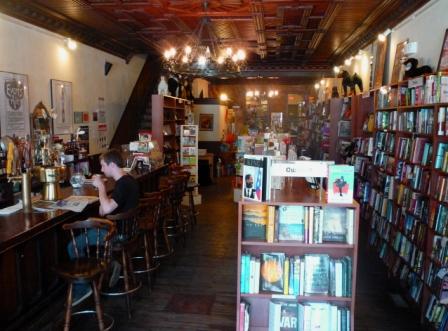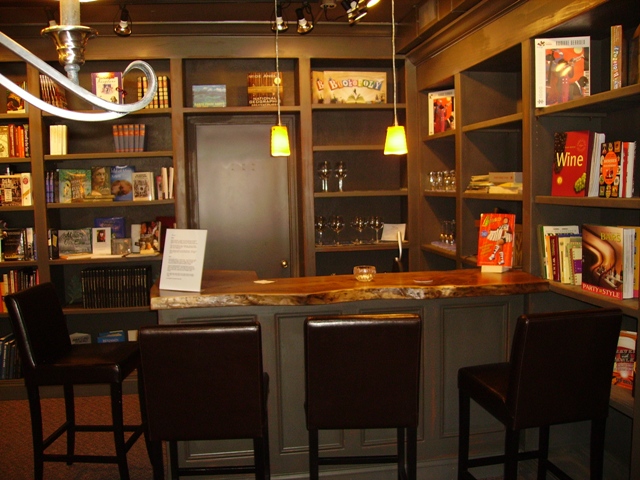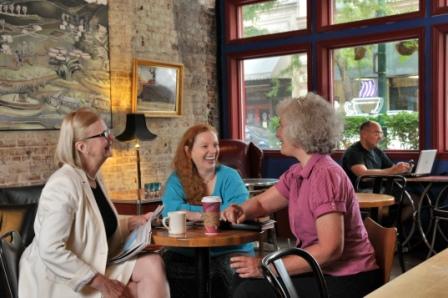- Categories:
Books + Booze an Old (and Profitable) Mix
Offering books and wine or beer is "a really old idea, sort of like a salon or an old school pub," where ideas and alcohol mix, said Jessica Puglisi of The Spotty Dog Books & Ale in Hudson, New York. Installing a bar can be a moneymaker, even if just a modest selection of wines and beers are sold. Booksellers from The Spotty Dog, I Know You Like a Book, and Taylor Books recently talked to BTW about the profitability and logistics of selling beer and wine at the bookstore.
Spotty Dog Books and Ale owner Kelley Drahushuk's great, great, great grandfather was the mayor of Hudson (between 1868 and 1872) and the owner of a brewery. "His namesake, my uncle C.H. Evans IV, now operates a brewpub that makes great beer," said Drahushuk, the co-owner of Spotty Dog with her husband, Alan Coon. When she and Coon wanted to expand their art supply business into a bookstore, her uncle suggested they also sell beer. "I said 'No!' The rest, as they say is history: a bookstore/art supply/lounge. I'm happy I was over-ruled."
Mary Beth Nebel, whose I Know You Like a Book in Peoria Heights, Illinois, now features a four-foot wine bar, got the idea from her customers. "I had one customer who would come into the store just about every Friday afternoon," said Nebel. "She would buy a book and say that she was going down the street to a local bar to have a glass of wine and start reading. I figured if I had a wine bar, I could keep the customers here longer."
Taylor Books in Charleston, West Virginia, started selling wine a year after the store opened in response to several customer requests. The bookstore also offers a café, a full-service coffee bar, and an array of music and book events. "The wine is a nice 'go with' for our program of events across the board," said manager Jennifer Waggener.
Spotty Dog's combination of beer/art supplies/books was described as "the holy trinity" by one happy customer, but "I wouldn't go that far," said Drahushuk. "I would say that people really enjoy the fact that we have beer and wine" and appreciate that the Spotty Dog is a family friendly "place where you can have a nice adult beverage while your kids hang out, too."
And happier customers staying longer lead to increased sales. "A common joke among first-time customers runs along the lines of 'Oh, get me drunk in a bookstore, I'm gonna buy the whole store!'" said Puglisi. "Though this hasn't yet happened, that we have customers spending much longer than they might in a non-beer store and interfacing with the booksellers as they receive shipments means that there's an increased opportunity for handselling and spontaneous recommendations. Books often get put on the bar to settle some sort of friendly debate, and this will often turn into an impulse purchase."
Furthermore, she said, "the bar allows us to have more in-depth relationships with customers and to discuss all matter of things, including books, than just having a coffee service would necessarily support. The more you talk to your customers, the better you can know what they will want to read."
In addition to being a reason to linger at the store, "serving beer and wine lends itself well to using the bookstore as a different type of events space," said Puglisi. "We've been able to develop a really strong evening and music-listening bar scene, which has been made possible largely because we are a partially a bar."
A busier events calendar has also spurred sales. Puglisi said that bi-weekly Quiz Nights have a rabid following of people, and many have become loyal book customers. "From the Quiz Night devotees, we've seen at least one Book Club evolve. It's really easy to entice Book Clubs with something beyond coffee."
I Know You Like a Book's Nebel suggested that adding beer and wine is "something other indies should consider." Her customers, she explained, "always make a point of bringing their guests to the store, because it's not something that they would typically experience in their own city."
It also suits the bookstore's Peoria Heights neighborhood. "I'm in an area where the bookstore/wine bar fits with the other businesses," Nebel said. "There are unique retailers and upscale restaurants in a two- to three-block area."
Drahushuk noted that under New York State law, a business is required to offer food if alcohol is served. Spotty Dog's menu includes cheese plates and other snacks, and there are always pretzels on the bar. Even if the state didn't require it, Spotty Dog would still serve something to eat, and Drahushuk advises other booksellers who are considering adding a bar to do the same. "Totally serve food," she said. "Drinking on an empty stomach equals bad news. I don't think you need to have a restaurant, just some snacks."
Waggener agreed. "Even if you only offer noshes/cheese plates/snack mixes and the like, not offering food with alcohol is just a bad idea. Not to mention a loss of profit possibility!"
Nebel decided against running even a minimal café, chiefly because she didn't have the room and didn't want to hire additional staff. She does, however, set out free light snacks.
"Selling wine and beer without selling food works for me, mainly because it's not the focus of the store," noted Nebel. "Customers are free to wander throughout the store with their beverages. I also sell a few wine-related sidelines such as a Napa Valley soap that's made with wine grapes, cocktail napkins, and bottle stoppers."
Asked if there were any caveats to selling beer and wine, Drahushuk said, "The book/beer crowd is a bit more considerate than your typical bar crowd, so we've only had to bounce one person in five years, but should have bounced a couple of others (especially the one who barfed all over our bathroom)."
To minimize problems (and clean up), she said, "Make sure your servers are not timid and have good sense about carding, not serving people when they shouldn't be served, etc. Also, serve quality products, and you will get people out to enjoy one or two delicious beverages, not to go on a binge. Unique micro-brew beers go well with books. Train your staff so they know what the drinks are that they are selling (alcohol content, styles, dry versus sweet, etc.)."
The primary concern, once a business decides to add beer and wine, is the liquor license, both in terms of costs and legal requirements, said Nebel. "You have to figure in the cost of licenses, liquor liability insurance, equipment, and product. In Illinois, beer and wine must be purchased from a licensed distributor, and the state liquor commission checks the premises once or twice a year for compliance." Nebel added that she only had one underage person try to buy a glass of wine. "When I asked for her ID, she ran out of the store."
Once the appropriate licenses are obtained, opening a wine bar doesn't necessarily mean stocking dozens and dozens of wines. At I Know You Like at Book, "usually, it's three whites, three reds, and three types of beer," said Nebel. "Spoilage can be a problem, so I price the glass of wine at the price of the bottle. That way, it's at least break even. Prices on wine range from $4 to $7."
All three booksellers agreed that being able to sit down with a drink is a big value-add for customers. "Wine has been a nice accompaniment to our clientele's overall experience of the store," said Waggener. "If handled properly, it can be a nice addition and enhancement to the spirit of the independent bookseller environment."
For Puglisi, a bookstore with a bar improved more than just margins: "The effect of having a bar atmosphere in a bookstore is, in my opinion, a great equalizer, and supplies a social lubricant that helps to realize the community potential held by independent bookstores. Beyond supplying books to a community, a bookstore supplies ideas, and there are few more surefire ways to get people talking than to offer them a drink in a comfortable space."




